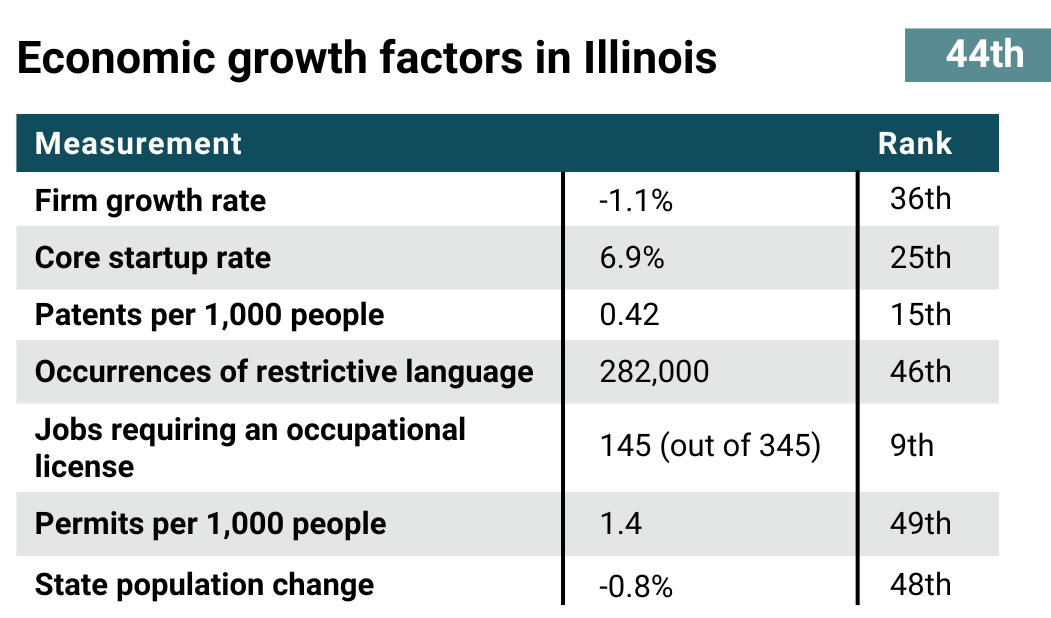Slow economic growth stops Illinoisans from getting ahead
Illinois ranks 44th in the country on entrepreneurship and economic growth, which stops people from getting ahead.
Most people aspire for a better standard of living than their parents and to secure the same opportunity for their children, but that social mobility is limited in Illinois by manmade policy barriers.
Burdensome regulations, high taxes and a static business environment keep too many Illinoisans from rising.
Illinois ranks 40th in the country for social mobility. The state ranks even lower – 44th – in “entrepreneurship and economic growth,” a key indicator of social mobility. That is by far the worst in the Midwest.
Illinois also has some of the highest rates of regulation and taxes in the country, driving companies away and stifling innovation. The state is ranked 46th in taxes, 39th in business dynamism and 32nd in regulation, the components of entrepreneurship and economic growth.
Business dynamism in Illinois lags in part because companies are leaving. High-profile firms have fled Illinois for friendlier business environments including Boeing, Citadel, and Tyson Foods. The New York Stock Exchange recently announced it’s closing its Chicago office after 143 years and leaving for Dallas. When companies move their headquarters or reduce their operations in Illinois, the state loses thousands of jobs and burdens increase for those who stay.

Illinois’ regulatory climate also makes it harder for businesses to operate and discourages innovation. As of 2023, Illinois had over 282,000 instances of restrictive language on the books, the fourth-highest number after California, New Jersey and New York. That is more than double the national average, while Idaho has only 39,000.
Too many Illinoisans must obtain an occupational license, which is effectively a government-issued permission slip, to work in professions that should not require a license and often don’t in other states. As many as 1 in 4 Illinoisans require an occupational license, with 145 out of 345 studied professions licensed.
Illinoisans also struggle to keep a roof over their heads. Illinois is the least affordable state for housing in the Midwest. Nearly one-third of Illinois residents are considered “housing burdened,” meaning they spend at least 30% of their income on housing. Illinois approves the second-fewest housing permits in the nation, with just 1.4 per 1,000 residents.
Illinois’ exorbitant tax rates also encourage business to flee and force families to make tough decisions. The state’s corporate, property and sales tax rates are all among the highest in the country, with a recent report by Moody’s Analytics ranking Illinois 46th-worst in the nation for business taxes – a major drag considering energy and labor costs were close to the middle of the nation.
Simply stated, Illinois is taxing itself out of business. Illinois experienced almost a decade of population decline, with the population estimates increasing in 2023 and 2024 only because there were so many international migrants. Many were shipped to Illinois without a choice, and there is evidence they may choose to leave for the same tax, job and housing reasons others are leaving Illinois. The international migrant influx was offset by 56,000 Illinoisans leaving for other states last year.
Policymakers can give Illinois’ future generations a better future. To get there, they need to change some things.
They must activate a review process to rescind unnecessary occupational licenses and enact universal license recognition so licenses granted by other states are valid in Illinois. They must be friendlier to job creators by replacing the state’s corporate tax with a state gross receipts tax.
And they must stop spending more than taxpayers can afford.
